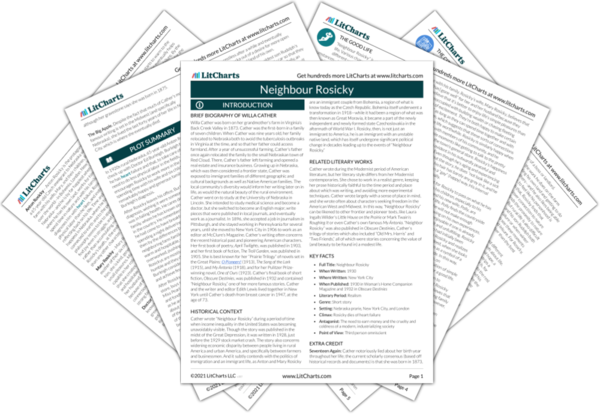Anton Rosicky’s heart and hands symbolize the idea that his hardworking lifestyle as a farmer is both taxing and deeply fulfilling. At the beginning of the story, Doctor Burleigh diagnoses Rosicky with heart failure, a condition that’s aggravated by (and perhaps even directly caused by) the hard labor Rosicky does on his family’s farm. Though Rosicky initially brushes off the diagnosis, it nevertheless makes him reflect on his life and the choices he’s made over the years. For instance, he’s chosen backbreaking work over comfort, a rural lifestyle over an urban one, self-sufficiency and risk over stable employment, and simplicity over affluence. In this sense, his heart condition represents the risk and hardship associated with the intentionally difficult way of life that Rosicky has chosen.
Throughout the story, however, it becomes clear that on a figurative level, Rosicky’s heart is anything but bad. While Rosicky has a “weak” heart medically speaking, his heart is emotionally strong in that it’s unendingly kind and generous to everyone he knows. And the story implies that the inner peace, freedom, and beauty of his life as a farmer is what allows him to radiate love and kindness to everyone around him. So, while the literal weakness of Rosicky’s heart suggests that living such a free and fulfilling life may have its limitations, his heart’s figurative strength suggests that such a life also has immense benefits. Thus, even though Rosicky’s life is perhaps cut shorter than it would have been if he’d chosen an easier path in life (his heart is weakened to the point that he dies at the end of the story), it’s implied that this more difficult path is meaningful and worthwhile.
This idea is also evident in Rosicky’s hands. Although Rosicky is 65 years old, and his hands have “deep, deep creases” from years of farming, his daughter-in-law Polly notices that they still look relatively young and smooth. Most farmers have “huge lumps of fists […] with stiff fingers,” but Rosicky’s hands seem to convey “cleverness” and “generosity.” In this way, Rosicky’s hands are a lot like his heart: they represent the physical toll that his life of hard labor has taken on him, but also and the freedom, contentment, and generous spirit that this lifestyle has facilitated. Thus, although Rosicky endures years of strenuous labor and intermittent struggle due to unpredictable crop failures, his heart remains kind and his hands remain “nimble and lively” right up to the end of his life—suggesting that the positives aspects of his lifestyle outweigh the negatives.
Rosicky’s Heart and Hands Quotes in Neighbour Rosicky
Maybe, Doctor Burleigh reflected, people as generous and warm-hearted and affectionate as the Rosickys never got ahead much; maybe you couldn’t enjoy your life and put it in the bank, too.

Unlock explanations and citation info for this and every other Neighbour Rosicky quote.
Plus so much more...
Get LitCharts A+Over there across the cornstalks his own roof and windmill looked so good to him that he promised himself to mind the Doctor and take care of himself. He was awful fond of his place, he admitted. He wasn’t anxious to leave it. And it was a comfort to think that he would never have to go farther than the edge of his own hayfield. The snow, falling over his barnyard and the graveyard, seemed to draw things together like. And they were all old neighbours in the graveyard, most of them friends; there was nothing to feel awkward or embarrassed about.
They had been at one accord not to hurry through life, not to be always skimping and saving. They saw their neighbours buy more land and feed more stock than they did, without discontent. Once when the creamery agent came to the Rosickys to persuade them to sell him their cream, he told them how much money the Fasslers, their nearest neighbours, had made on their cream last year.
“Yes,” said Mary, “and look at them Fassler children! Pale, pinched little things, they look like skimmed milk. I’d rather put some colour into my children’s faces than put money into the bank.”
The agent shrugged and turned to Anton.
“I guess we’ll do like she says,” said Rosicky.
Well, when I come to realize what I done, of course, I felt terrible. I felt better in de stomach, but very bad in de heart. I set on my bed wid dat platter on my knees, an’ it all come to me; how hard dat poor woman save to buy dat goose, and how she get some neighbour to cook it dat got more fire, an’ how she put it in my corner to keep it away from dem hungry children. Dey was a old carpet hung up to shut my corner off, an’ de children wasn’t allowed to go in dere. An’ I know she put it in my corner because she trust me more’n she did de violin boy. I can’t stand it to face her after I spoil de Christmas. So I put on my shoes and go out into de city. I tell myself I better throw myself in de river; but I guess I ain’t dat kind of a boy.
It wasn’t nervous, it wasn’t a stupid lump; it was a warm brown human hand, with some cleverness in it, a great deal of generosity, and something else which Polly could only call “gypsy-like,”—something nimble and lively and sure, in the way that animals are.
Polly remembered that hour long afterwards; it had been like an awakening to her. It seemed to her that she had never learned so much about life from anything as from old Rosicky’s hand. It brought her to herself; it communicated some direct and untranslatable message.
He was thinking, indeed, about Polly, and how he might never have known what a tender heart she had if he hadn’t got sick over there.












